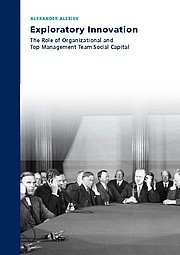Exploratory Innovation: The Role of Organizational and Top Management Team Social Capital Defended on Thursday, 9 September 2010
One of the most difficult challenges for organizations is to innovate beyond their existing technological and market trajectories. Despite being complex, exploratory innovation is needed for the long-term survival of the enterprise. Existing studies point to economic triggers that can foster its pursuit: decline of firm performance or availability of slack resources. However, these factors may still fail to ensure adaptation if organizations are unable to act on emerging opportunities or to respond timely to environmental threats.
This dissertation advocates a behavioral and learning approach to study exploratory innovation. The concept is dissected into four organizational issues and processes: creation of search routines, learning of divergent knowledge, environmental sensing and strategic decision making. A framework for the antecedents, mediators and moderators of exploratory innovation is developed by combining insights from organizational social capital and upper echelon literature.
The empirical studies that examined specific relationships from the framework demonstrated the significance of organizational and top management team (TMT) social capital as antecedents of exploratory innovation. Firms that explore often possess also a capability for knowledge acquisition. TMTs tap into their social capital by engaging in external and internal advice seeking. Findings show that external advice seeking can promote exploratory innovation in firms with homogeneous TMTs and comprehensive decision making in organizations with less empowered lower-level managers.
Keywords
exploratory innovation, top management teams, social capital, organizational learning, knowledge, decision-making, diversity, empowerment, strategy












